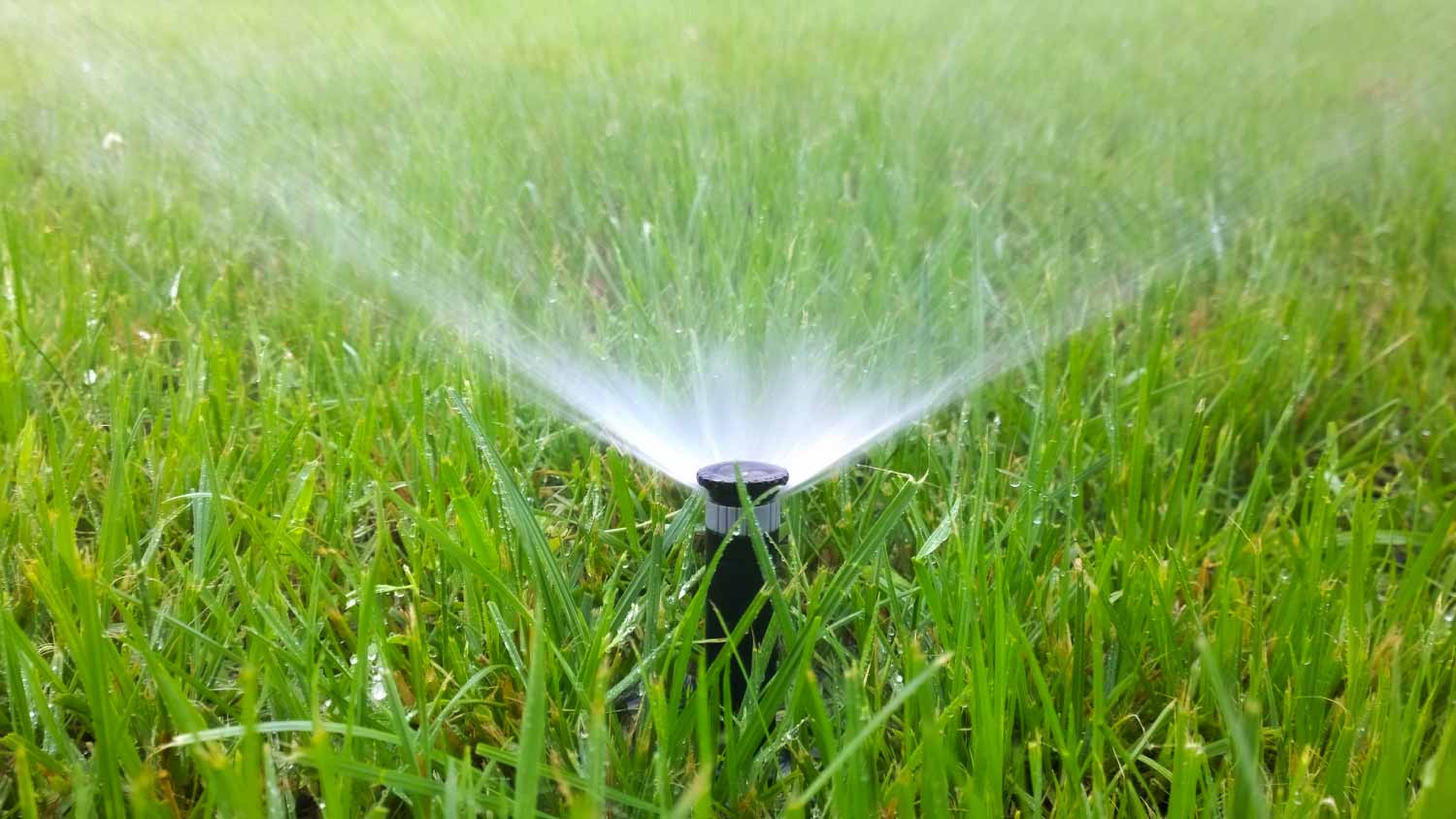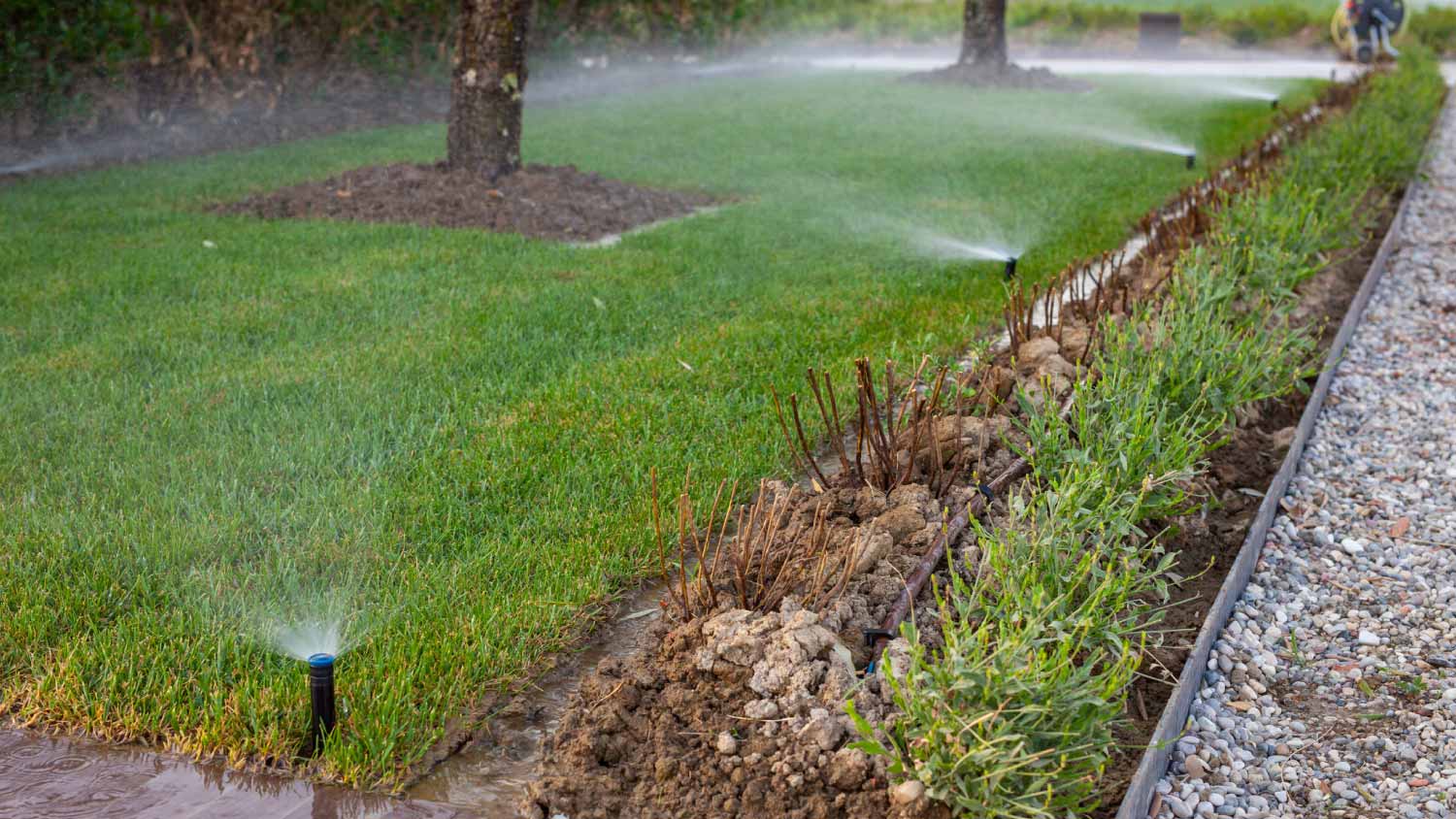
Discover the average outdoor misting system cost, key price factors, and tips to save money on installation and maintenance for your home.
The grass is always greener—as long as you have a working sprinkler system


Most irrigation pump issues are caused by water pressure fluctuation.
If your pump is leaky or clogged, it can cause low water pressure.
Failure to prime your pump can damage your system.
Since many irrigation pump issues have multiple causes, it’s best to call a pro for repairs.
Your sprinkler system is the key to a lush lawn, but occasionally, one of the components will need a repair. The irrigation pump is among the most critical—it’s what pushes water through the system. If it's not working correctly, you may notice issues like low water pressure, weird noises, and dry patches on your lawn. Though the most common problems with irrigation pumps can have multiple causes, this guide can help you find the right fix.
Low or fluctuating water pressure is one of the most common problems with irrigation pumps. If this is your issue, you may notice problems like:
Sprinklers mist rather than produce a solid spray
Dry patches in your lawn
Sprinkler heads don’t (or barely) produce water
Sprinklers take a long time to turn on
Inconsistent pressure can have several different causes—and it’s not always your pump. It could be something as simple as a clogged nozzle or valve, buildup from hard water, or a leak somewhere in the system.
If your water pressure is consistently low, you may need to install a booster pump or redistribute your sprinkler heads. Adding additional zones with more nozzles can help. Other times, you may need a pump repair or work on the municipal water supply. The best course of action to fix inconsistent water pressure is to call a sprinkler repair pro near you.
Your sprinklers won’t work if the irrigation pump won’t turn on. This usually points to a problem with the electrical wiring or one of the individual components within the pump, like the motor.
First, check to see if your pump tripped a circuit breaker. If the circuit is on, inspect your pump’s wiring for loose connections or damage. You’ll need to call a local electrician to make electrical repairs. If power isn’t the issue, it’s likely a broken pump motor. Hire a pro to repair or replace it.

Inconsistent water pressure can actually damage your sprinkler heads. High pressure can crack the nozzles. Too little pressure can prevent the sprinkler heads from popping up when you start your system. Inconsistent pressure can also push debris into your sprinkler heads, clogging the nozzles.
If your sprinkler heads are clogged with debris, remove them and clean them. You may need to replace damaged sprinkler heads. To solve the underlying issue with water pressure, you’ll need to call a pro.
Is your irrigation system simply not working like it used to? Poor performance can be a result of not priming your irrigation pump. Priming pushes air out of the pump casing and suction lines, filling them with water. Without priming, your pump won’t be able to effectively draw in water. It may overheat or prematurely wear, and you may notice low or no water pressure.
Prime your pump. Many irrigation systems are self-priming, but you still may need to fill the casing with water before running your sprinkler. If your system needs to be repeatedly primed between cycles, you probably have a broken valve that needs repair.
Your sprinkler pump can have normal wear and tear and spring a leak, especially if it’s working overtime because it hasn’t been properly maintained. This will cause low water pressure.
Since there are a lot of reasons your sprinkler system can leak, you’ll need to narrow down the exact source. Check the connections around the pump. You may have to tighten loose connections or replace damaged hoses.
You may need to drain your irrigation pump before temperatures dip below freezing, though newer pumps may do it automatically. If you forget, water that’s left inside your pump will expand as it freezes. This can crack the pump.
Make sure you winterize your sprinkler system. If components are damaged from the season before, hire a pro for a repair or replacement.

There are a few reasons your pump might sound a bit louder than usual. Sometimes, the parts need lubrication, the mount isn’t secure, or there are clogs inside the system. Another cause has to do with the suction lift—how high your pump is above the surface of the water. If the distance is too great, your pump will make excess noise.
Inspect the pump for debris and clear clogs as needed. Lubricate the moving parts and ensure the pump mounts are fully secure. If that doesn’t work, you may be able to solve the problem by relocating the pump closer to the water source, but you should call a pro for this type of repair.
Your sprinkler system has a lot of different components. Even just the pump itself relies on very specific mechanics. Call a pro for sprinkler repair anytime you have a problem you can’t solve with a simple fix, like clearing away a clog or flipping a circuit breaker. DIY work can damage your system if you don’t know what you’re doing.
From average costs to expert advice, get all the answers you need to get your job done.

Discover the average outdoor misting system cost, key price factors, and tips to save money on installation and maintenance for your home.

Discover drip irrigation system cost estimates, key price factors, and ways to save. Get transparent pricing to plan your home irrigation project confidently.

A sprinkler system can keep your lawn and garden watered, but sometimes it needs to be repaired. Here’s how much it will cost to have a plumber fix it.

Need to repair a sprinkler or install a new one? Learn the parts of the sprinkler system and how they all work together to water your lawn and garden.

Changing an irrigation valve is an important part of sprinkler maintenance that can completely refresh your sprinkler system. Learn how with this guide.

Can an irrigation system leak if turned off? It unfortunately can. We’ll show you eight signs to watch for that indicate a leak in your irrigation system.